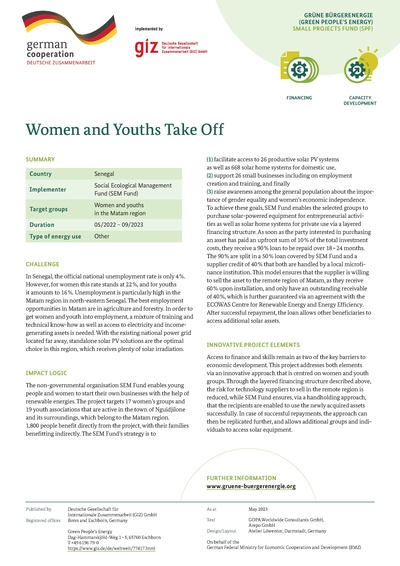Knowledge fuels change - Support energypedia!
For over 10 years, energypedia has been connecting energy experts around the world — helping them share knowledge, learn from each other, and accelerate the global energy transition.
Today, we ask for your support to keep this platform free and accessible to all.
Even a small contribution makes a big difference! If just 10–20% of our 60,000+ monthly visitors donated the equivalent of a cup of coffee — €5 — Energypedia would be fully funded for a whole year.
Is the knowledge you’ve gained through Energypedia this year worth €5 or more?
Your donation keeps the platform running, helps us create new knowledge products, and contributes directly to achieving SDG 7.
Thank you for your support, your donation, big or small, truly matters!
Difference between revisions of "Women and Youths Take Off"
***** (***** | *****) m Tag: 2017 source edit |
***** (***** | *****) |
||
| (4 intermediate revisions by one other user not shown) | |||
| Line 2: | Line 2: | ||
|GBE project name=Women and Youths Take Off | |GBE project name=Women and Youths Take Off | ||
|GBE organisation=Social Ecological Management Fund (SEM Fund) | |GBE organisation=Social Ecological Management Fund (SEM Fund) | ||
| − | |GBE date start=2022 | + | |GBE date start=May 2022 |
| − | |GBE date end=2023 | + | |GBE date end=September 2023 |
| − | |GBE project description=The non-governmental organisation SEM Fund enables | + | |GBE project description=The non-governmental organisation SEM Fund enables young people and women to start their own businesses with the help of renewable energies. The project targets 17 women’s groups and 19 youth associations that are active in the town of Nguidjilone and its surroundings, which belong to the Matam region. 1,800 people benefit directly from the project, with their families benefitting indirectly. The SEM Fund’s strategy is to (1) facilitate access to 26 productive solar PV systems as well as 668 solar home systems for domestic use, (2) support 26 small businesses including on employment creation and training, and finally (3) raise awareness among the general population about the importance of gender equality and women’s economic independence. To achieve these goals, SEM Fund enables the selected groups to purchase solar-powered equipment for entrepreneurial activities as well as solar home systems for private use via a layered financing structure. As soon as the party interested in purchasing an asset has paid an upfront sum of 10% of the total investment costs, they receive a 90% loan to be repaid over 18–24 months. The 90% are split in a 50% loan covered by SEM Fund and a supplier credit of 40% that both are handled by a local microfinance institution. |
| − | This model ensures that the supplier is willing to sell the asset to the remote region of Matam, as they receive 60% upon installation, and only have an outstanding receivable of 40%, which is further guaranteed via an agreement with the ECOWAS Centre for Renewable Energy and Energy Efficiency. After successful repayment, the loan allows other beneficiaries to access additional solar assets. Access to finance and skills remain as two of the key barriers | + | |
| − | to economic development. This project addresses both elements via an innovative approach that is centred on women and youth groups. Through the layered financing structure described above, the risk for technology suppliers to sell in the remote region is reduced, while SEM Fund ensures, via a handholding approach, that the recipients are enabled to use the newly acquired assets successfully. In case of | + | This model ensures that the supplier is willing to sell the asset to the remote region of Matam, as they receive 60% upon installation, and only have an outstanding receivable of 40%, which is further guaranteed via an agreement with the ECOWAS Centre for Renewable Energy and Energy Efficiency. After successful repayment, the loan allows other beneficiaries to access additional solar assets. Access to finance and skills remain as two of the key barriers to economic development. This project addresses both elements via an innovative approach that is centred on women and youth groups. Through the layered financing structure described above, the risk for technology suppliers to sell in the remote region is reduced, while SEM Fund ensures, via a handholding approach, that the recipients are enabled to use the newly acquired assets successfully. In case of successful repayments, the approach can then be replicated further, and allows additional groups and individuals to access solar equipment. |
| − | equipment. | ||
|GBE financed=Small Projects Fund | |GBE financed=Small Projects Fund | ||
| + | |GBE category produse=Productive Use | ||
|GBE category financing=Financing | |GBE category financing=Financing | ||
|GBE category gender=Gender | |GBE category gender=Gender | ||
|GBE countrySPF=Senegal | |GBE countrySPF=Senegal | ||
|GBE locationSPF=15.00288, -13.92401 | |GBE locationSPF=15.00288, -13.92401 | ||
| − | + | |GBE FS source=Wiki Upload | |
| − | + | |GBE FS source Wiki=GBE-SPF_SEM Fund_Projectfactsheet.pdf | |
| − | |GBE | ||
| − | |GBE | ||
| − | |||
}} | }} | ||
Latest revision as of 14:05, 14 May 2024
Women and Youths Take Off
Key Data
- Productive Use
- Financing
- Gender
Location




















